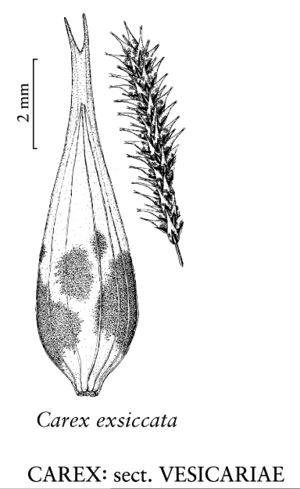Carex rostrata
in W. Withering, Bot. Arr. Brit. Pl. ed. 2, 2: 1059. 1787.
Plants colonial; rhizomes long. Culms terete or very bluntly trigonous in cross section, 8–90 cm, smooth distally. Leaves: basal sheaths brown, occasionally tinged with pinkish red; ligules as long as wide; blades whitish green, U-shaped, with involute margins, widest leaves 1.5–4.5(–7.5) mm wide, papillose adaxially. Inflorescences 10–30 cm; proximal bract 18–45 cm, exceeding but no more than 2.5 times longer than inflorescence; proximal (1–)2–3 spikes pistillate, erect or the proximal ascending, ca. 20–150-flowered, cylindric; terminal (1–)2–4 spikes staminate, well elevated beyond summit of separate pistillate spikes. Pistillate scales lanceolate ovate, 2.5–4.5(–8.8) × 0.8–1.6 mm, mostly shorter than perigynia, margins entire, apex acute to acuminate (rarely acuminate-awned). Perigynia spreading, often green or straw colored, 9–15-veined, veins running into beak, ovate, 3.6–5.8 × 1.7–2.8 mm, apex contracted; beak (1–)1.2–2 mm, bidentulate, smooth, teeth straight, 0.2–0.7 mm. Stigmas 3. Achenes brown, symmetric, not indented, trigonous, smooth. 2n = 60.
Phenology: Fruiting Jun–Aug.
Habitat: Fens, especially in flarks in patterned fens, bogs and bog pools, lake and stream shores, often in shallow water or on floating mats
Elevation: 0–1600 m
Distribution

Greenland, Alta., B.C., Man., N.B., Nfld. and Labr., N.W.T., N.S., Nunavut, Ont., Que., Sask., Yukon, Alaska, Mich., Minn., Mont., Wash., Wis., Eurasia.
Discussion
Carex rostrata is infrequent and local in large portions of its range, often forming large colonies where found. Carex rostrata hybridizes with C. oligosperma and C. saxatilis; rare sterile intermediates with C. utriculata are likely hybrids. The vast majority of records of C. rostrata from North America are C. utriculata.
Selected References
None.
